The Korean War is one of the least-known wars in the history of the United States. Most of the American public knows we fought in the Korean War, and a few even know combat lasted from 1950 to 1953, and that more than 36,000 Americans died trying to prevent Communist North Korea from overrunning the democratic republic established in South Korea. Almost all Americans assume this was the one and only Korean War fought by the United States.
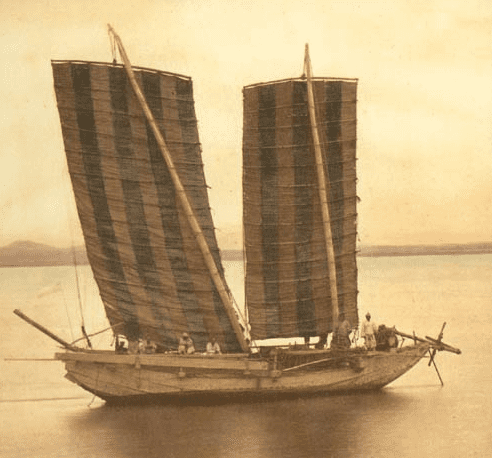
However, there was actually a previous Korean War, when American military forces attacked Korea in the 19th century. It may not be well remembered now, but it was sensational news in the summer of 1871. As the following newspaper articles show, it was a war that was welcomed and strongly supported in the United States – although there was some opposition.
Korea at that time followed a strict policy of isolationism, wary of the Western intervention that had disrupted China with the Opium Wars. The Americans, however, believed in “Gunboat Diplomacy,” such as Commodore Matthew Perry had used when he sailed a U.S. war fleet into Japanese waters in 1853 and forced Japan to open itself to trade. The expedition to Korea in 1871 was ostensibly another “peaceful” trade mission.

This squadron was led by Rear Admiral John Rodgers. Although it was accompanied by Frederick F. Low, the U.S. Ambassador to China, and billed as a trade mission, the expedition consisted of 5 warships bristling with 85 guns, over 1,400 personnel, and 6 pieces of field artillery plus Gatling guns (early machine guns) for the anticipated land assault.
Five years prior to the Korean Expedition, in 1866, a U.S. merchant seaman – the General Sherman – had tried to force its way into Korean waters and been attacked, resulting in the loss of 20 Americans and the ship. The 1871 expedition claimed it wanted to investigate the fate of the General Sherman, as well as peacefully conduct trade negotiations. When the squadron ignored Korea’s isolationist policy and started patrolling in Korean waters, land artillery opened up on June 1 to drive the ships away.
In retaliation, the Americans launched an assault on 10 June 1871, landing 650 men with modern weaponry against five Korean forts defended by about 300 men with obsolete rifles. It was no contest. In two days, the Americans captured all five forts, killed more than 200 Koreans while losing only 3 men, and demonstrated the superiority of American firepower.
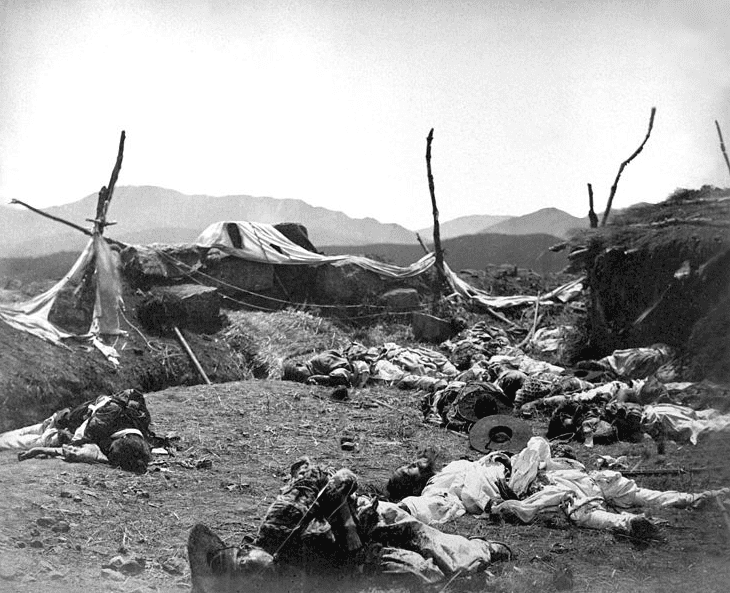
The Koreans still tried to resist the American demands for a treaty, but gave in 11 years later, signing a trade treaty with the U.S. in May 1882.
The following five newspaper articles show how the news of the “Korean War” was reported to Americans in 1871. The first four articles all praised the American assault, but the fifth article criticized it. Note that these articles spell Korea “Corea.” They also greatly exaggerate the number of Korean defenders, claiming the forts were defended by 11,000 men when in fact there were about 300.
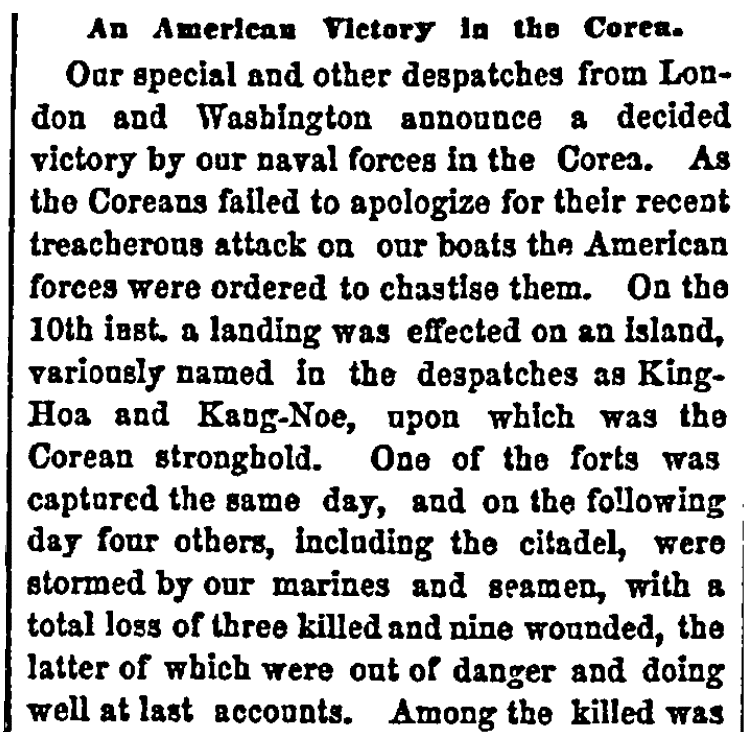
Here is a transcription of this article:
An American Victory in the Corea.
Our special and other dispatches from London and Washington announce a decided victory by our naval forces in the Corea. As the Coreans failed to apologize for their recent treacherous attack on our boats the American forces were ordered to chastise them. On the 10th inst. a landing was effected on an island, variously named in the dispatches as King-Hoa and Kang-Noe, upon which was the Corean stronghold. One of the forts was captured the same day, and on the following day four others, including the citadel, were stormed by our marines and seamen, with a total loss of three killed and nine wounded, the latter of which were out of danger and doing well at last accounts. Among the killed was Lieutenant McKee, of the navy, a gallant and promising young officer. Not less than two hundred and forty-three dead Coreans were counted in and around the citadel, showing how desperately they defended their position. Their weapons, however, must, fortunately for us, have been of the most wretched description, considering the disparity of the losses, five hundred in killed and wounded being the total loss of the Coreans.
Important results ought to follow this victory. It should convince the government of Corea that a struggle with the United States offers no possible hope of success. If a comparative handful of Americans can defeat eleven thousand Coreans, storm five forts and capture nearly five hundred pieces of artillery, what would be the result of a regular invasion of the country? The wisest thing that the King of Corea can now do is to apologize, pay an indemnity and make a commercial treaty with the United States.
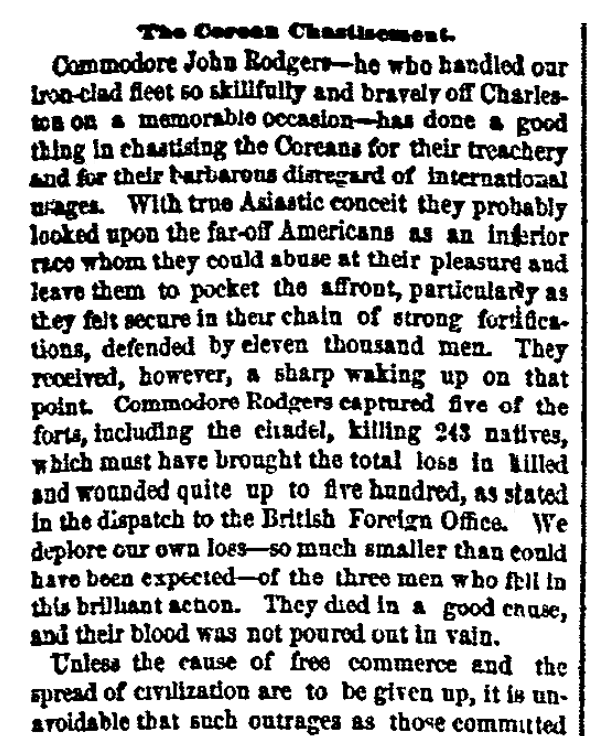
Here is a transcription of this article:
The Corean Chastisement.
Commodore John Rodgers – he who handled our ironclad fleet so skillfully and bravely off Charleston on a memorable occasion – has done a good thing in chastising the Coreans for their treachery and for their barbarous disregard of international usages. With true Asiatic conceit they probably looked upon the far-off Americans as an inferior race whom they could abuse at their pleasure and leave them to pocket the affront, particularly as they felt secure in their chain of strong fortifications, defended by eleven thousand men. They received, however, a sharp waking up on that point. Commodore Rodgers captured five of the forts, including the citadel, killing 243 natives, which must have brought the total loss in killed and wounded quite up to five hundred, as stated in the dispatch to the British Foreign Office. We deplore our own loss – so much smaller than could have been expected – of the three men who fell in this brilliant action. They died in a good cause, and their blood was not poured out in vain.
Unless the cause of free commerce and the spread of civilization are to be given up, it is unavoidable that such outrages as those committed by the Coreans must be punished with a prompt and heavy hand. Any other course would be misconstrued as proceeding from fear or weakness, and would only tend to invite a repetition of the abuse. The Asiatic respects power and not much else, and it is the prerogative of the enlightened nations of the West to teach him the invincibility of power when combined with justice. The American name, we dare say, will be respected, after this, all along the Asiatic coast as it has never been before. Our gallant navy is small, but we trust it will never be unable to repel insults and punish aggression wherever they may occur.
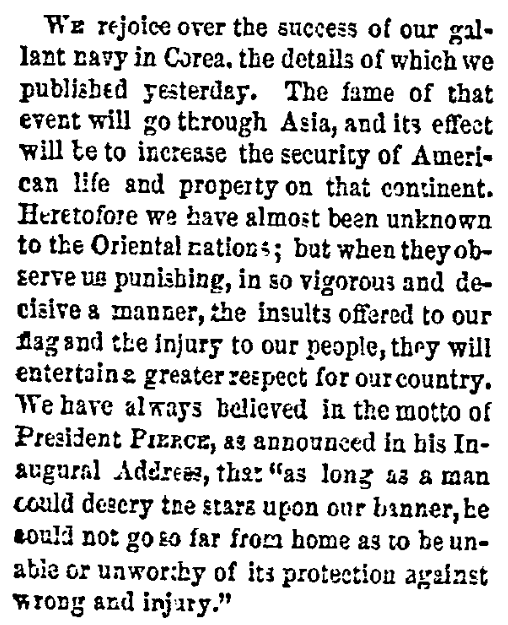
Here is a transcription of this article:
We rejoice over the success of our gallant navy in Corea, the details of which we published yesterday. The fame of that event will go through Asia, and its effect will be to increase the security of American life and property on that continent. Heretofore we have almost been unknown to the Oriental nations; but when they observe us punishing, in so vigorous and decisive a manner, the insults offered to our flag and the injury to our people, they will entertain a greater respect for our country. We have always believed in the motto of President Pierce, as announced in his Inaugural Address, that “as long as a man could descry the stars upon our banner, he could not go so far from home as to be unable or unworthy of its protection against wrong and injury.”
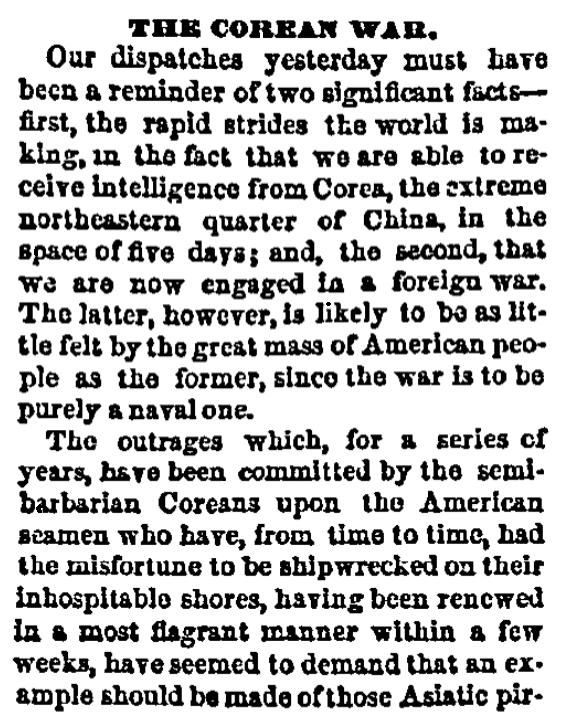
Here is a transcription of this article:
THE COREAN WAR.
Our dispatches yesterday must have been a reminder of two significant facts – first, the rapid strides the world is making, in the fact that we are able to receive intelligence from Corea, the extreme northeastern quarter of China, in the space of five days; and, the second, that we are now engaged in a foreign war. The latter, however, is likely to be as little felt by the great mass of American people as the former, since the war is to be purely a naval one.
The outrages which, for a series of years, have been committed by the semi-barbarian Coreans upon the American seamen who have, from time to time, had the misfortune to be shipwrecked on their inhospitable shores, having been renewed in a most flagrant manner within a few weeks, have seemed to demand that an example should be made of those Asiatic pirates and outlaws. Com. Rodgers, commanding the American squadron on that coast, was instructed to administer summary chastisement, and his report shows that he has obeyed his instructions to the letter. He reports that he commenced the attack on the Corean forts on the 10th, and up to the 23d, five of them had been captured with 481 pieces of Corean artillery (chiefly of brass pieces) and many small arms. These forts are reported to have been defended by 11,000 Corean troops of whom 243 were killed. Only three Americans were killed, including one Lieutenant, and nine wounded, the latter being out of danger.
So far the victory of Com. Rodgers appears to have been complete, and the fears that this force would be insufficient seem unfounded. Still, in order to make chastisement thorough, he may need a land force, should it be necessary to pursue the fugitives into the interior. It is to the interest of all civilized nations that these barbarian freebooters should be taught a lesson, and America will lose nothing in the estimation of the world by becoming the instrument in doing this.
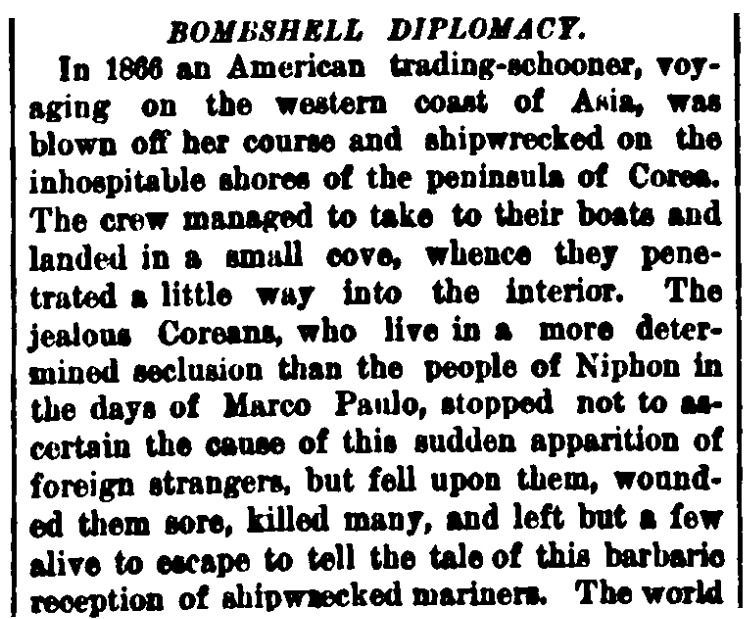
Here is a transcription of this article:
BOMBSHELL DIPLOMACY.
In 1866 an American trading-schooner, voyaging on the western coast of Asia, was blown off her course and shipwrecked on the inhospitable shores of the peninsula of Corea. The crew managed to take to their boats and landed in a small cove, whence they penetrated a little way into the interior. The jealous Coreans, who live in a more determined seclusion than the people of Niphon in the days of Marco Paulo [Polo], stopped not to ascertain the cause of this sudden apparition of foreign strangers, but fell upon them, wounded them sore, killed many, and left but a few alive to escape to tell the tale of this barbaric reception of shipwrecked mariners…
…Have we killed Coreans enough to avenge the [names] of the slaughtered American sailors? If so, let us haul off and say no more about it. But if Minister Low’s instructions impel him to the capital, which is seventy-five miles inland, the difficulties of the way and the brutality of this bombshell diplomacy may well give us pause. When the Feejeeans ate our shipwrecked sailors, we exacted a penalty in coin of the cannibal islanders, and took a mortgage on their kingdom until it was paid. But the large-statured, brave, and warlike Coreans will never come to such terms, and whether the violent blows which the American expedition is now hammering on the Corean sconce be meant in vengeance for the past or civilization for the future, we shall find the contest long, expensive, and resultless. They can afford to part with many thousands of their people. Men who commit suicide as we give compliments set no great store by their own or their fellow-countrymen’s lives. It is plain that we are not wanted in the Corea. Whether we go with olive branch and Yankee notions, or firebrands and war, we are alike unwelcome. Why should we force the privacy of an ancient nation? Why break in upon the seclusion of ages because it has existed for ages? Is our sort of civilization so saving, so precious, that men must have it forced upon them at the cannon’s mouth? We have surely spilt blood enough to wash the stain of the original Corean barbarity. Now let us stay our hand, nor think we shall compel the Corean of today to be a civilized Christian gentleman, like Admiral Porter, by holding a pistol to his ear.
Note: An online collection of newspapers, such as GenealogyBank’s Historical Newspaper Archives, is not only a great way to learn about the lives of your ancestors – the old newspaper articles also help you understand American history and the times your ancestors lived in, and the news they talked about and read in their local papers. Did any of your ancestors serve in America’s first Korean War? Please share your stories with us in the comments section.
Explore over 330 years of newspapers and historical records in GenealogyBank. Discover your family story! Start a 7-Day Free Trial

Here is a short documentary about this action:
https://www.youtube.com/watch?v=vUW-fGRZUEA